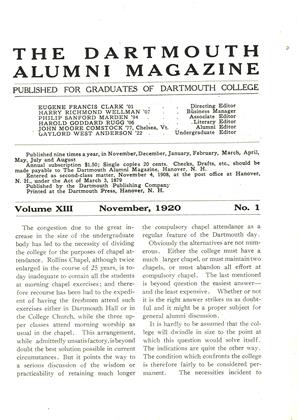"Does the Dartmouth Spirit still live?" This is the inevitable question of the alumnus who comes back to see the "small" college of his undergraduate days, now grown into an institution whose entering classes equal in size those of Harvard and Yale. Assurances in the affirmative, no matter how numerous, cannot furnish so effective an answer as a recent incident in Hanover. The football team, after a heart-breaking defeat at the hands of Penn State, arrived in Hanover in the "wee sma'" hours of Monday morning. Not even in overwhelmingly victorious team would really expect to be greeted by any other than an occasional late prowler. Yet the entire student body turned out and waited for two hours and a half in the middle of the night to welcome the tired athletes. None other than a real living Dartmouth Spirit could have produced such an event.
It is true that there has been at times worry lest all was not well with the college spirit. The past tew years have been hard years for the undergraduate morale. The continuity of college life has been broken. College life itself has seemed a little bit small and trivial after the stirring times of the war. College students, as well as other people, have been susceptible to the let-down in morale that always follows periods such as that of the recent conflict.
Dartmouth has felt the slump. College activities have suffered from lack of interest. College exercises have been marked by indifference on the part of the students. There has been no solid body of upperclass opinion to instruct the freshman in Dartmouth ideals and steer him along the path that makes for college unity and undergraduate enthusiasm. The movies have claimed more time than athletics, dramatics, the publications, even than study itself. To one who has seen the College in days before the "show" was a regular evening institution, the unfortunate effect of this distraction cannot be overestimated. It has robbed Dartmouth of some of its distinctiveness, and for a while seemed in danger of sucking out the life of the college activities. All of these elements, piling up during the first burst of reconstruction, produced apathy, distraction, and confusion, and not a little doubt as to whether the Dartmouth Spirit had survived the war or was to be looked for on the casualty list.
But today there can be no doubt on that point. The old spirit is with us, battered and bruised somewhat, and a little lame in spots from the drubbing of adverse conditions but thoroughly alive and essentially sound, carrying along only such scars as a short period of normal life will erase.
No man today can really expect to know all the men of his class, for it would be a greater task than knowing the entire college a few years back. But within the limit of possibility, the old advantages are being maintained. The freshman Commons, compulsory for all members of the entering class, ensures that the majority of the freshman shall get a look at each other at least three times a day. The College is still democratic in its ideals, and there are few signs of any "gold coast" or snobbishness. The classes still mix to a surprising degree, in view of the swamping numerical superiority of the two lower classes.
Of course Dartmouth will never be the same again, but who would ever want her to be just the same. We are meeting new conditions and developing to meet them. But although the outward appearance may be different, although customs that the old graduate knew and loved may be gone, the spirit that produced them and the college morale that they represented are still here in rejuvenated form and seeking expression in ways that are new, and, we are confident, better adapted than the old to meet the changed conditions of college life,
 View Full Issue
View Full Issue
More From This Issue
-
 Article
ArticleThe congestion due to the great increase in the size of the undergraduate
November 1920 -
 Article
ArticleADDRESS OF PRESIDENT ERNEST MARTIN HOPKINS AT THE OPENING OF DARTMOUTH COLLEGE, SEPTEMBER 23, 1920
November 1920 -
 Class Notes
Class NotesCLASS OF 1910
November 1920 By W. H EASTMAN -
 Article
ArticleBENJAMIN AMES KIMBALL '54
November 1920 By HARLAN C. PEARSON '93 -
 Class Notes
Class NotesREUNIONS CLASS OF 1870
November 1920 By A.S. ABERNETHY -
 Class Notes
Class NotesCLASS OF 1910
November 1920 By Whitney H. Eastman







